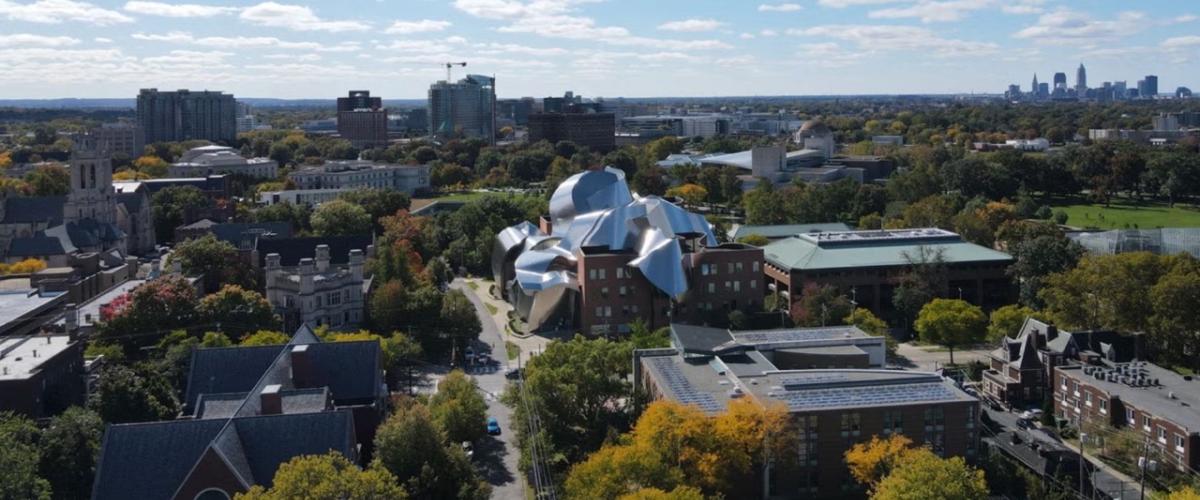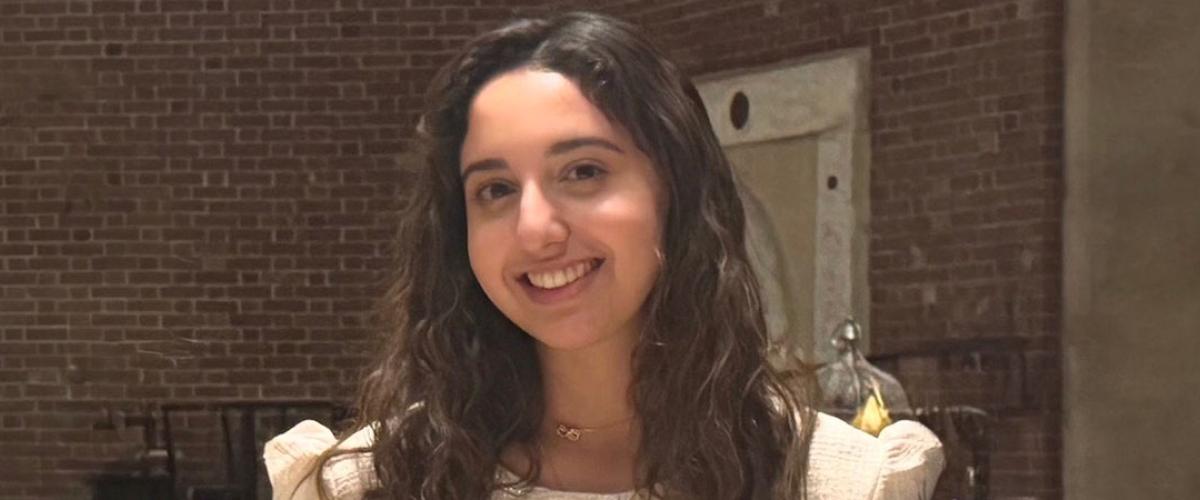Ready to register for spring courses? Check out 12 interesting options to add to your schedule
From AI to medieval robots, spring 2026 courses cover a wide range of interesting topics
Cleveland’s first snowfall arrived overnight, reminding us that while winter is just beginning, spring is right around the corner. Case Western Reserve University undergraduate students can begin registering for spring 2026 classes today (Nov. 10).
Upper-class students get first dibs, with appointments opening progressively throughout the week based on how many credits a student has completed. Not sure when your appointment begins? Check the University Registrar’s website.
Whether you’ve perfectly crafted a schedule and want to add one more course, or you’re still looking for just the right electives, we’ve got you covered with 12 unique options to consider. No matter your area of study or where your interests lie, there’s something on this list for you.
Take a look, and once you’re ready, head to SIS to sign up.
ANEE/WLIT 210: “Ancient Near Eastern and Egyptian Literature”
Instructor: Aaron Beek
Tuesdays and Thursdays from 11:30 a.m. to 12:45 p.m.
This communication-intensive course offers an introductory survey to the literature of ancient Egypt and the Middle East, including stories about the creation of the world, the great flood, the Epic of Gilgamesh, and the gods of Egypt.
All texts will be read and discussed in English translation.
CRSP 529/MGRD 529/PHRM 529/RGME 529: “FDA Regulation in Entrepreneurship and Clinical Research”
Instructors: Philip Cola, Linda Mangosh
Tuesdays from 4 to 6 p.m. via Zoom
This course is designed to provide foundational knowledge in the Food and Drug Administration’s (FDA) approval and regulatory process while highlighting scientific, clinical, ethical and other related emergent factors for consideration. The primary goal of this course is that upon completion, students will be able to take the knowledge gained from content experts and apply it to facilitate the movement of their current or future technologies through the FDA approval process.
The course is open to graduate students at the master's and PhD levels, undergraduates with permission, and individuals who are not taking courses at CWRU (can be taken for a certificate). The goal is to have a transdisciplinary cohort of students across levels and school and external constituents.
CSDS 102: “AI for All Disciplines”
Instructor: Sanmukh Kuppannagari
Mondays and Wednesdays from 11:40 a.m. to 12:30 p.m.
This course is intended for students from all disciplines interested in the applications and implications of AI and machine learning. This course will cover the history, development, use, and application of key AI and machine learning ideas.
Students will gain hands-on, practical experience working with existing AI/machine learning tools to solve problems of interest in science, engineering, business and the humanities. Discussions of the societal impacts of this technology, including ethical considerations, will be interwoven throughout the class.
Prerequisites: (CSDS 101 or CSDS 132 or ECSE 132 or DESN 210 or ENGR 131) and no current or previous enrollment in a 300-level CSDS course
GENE 325: “Introduction to Genetic Counseling”
Instructor: Michelle Merrill
Mondays from 12:45 to 2 p.m.
This course introduces the growing field of genetic counseling and is intended for undergraduate students exploring possible healthcare careers. It covers fundamental topics such as general genetics principles, genetic specialties and genetic disorders; risk assessment; psychosocial and communication skills; and ethics.
Students will test their knowledge using case studies representing a range of common areas of practice, including pediatrics, prenatal care, general genetics, laboratory and research, and cancer genetics. This course will introduce students to this field and will give students interested in graduate school increased exposure to the profession.
Prerequisites: BIOL 214 and BIOL 215 and BIOL 326
MGMT 221: “Doing Good - How Nonprofits Change Lives”
Instructor: Christine Henry
Tuesdays and Thursdays from 10 to 11:15 a.m.
Discover how nonprofits drive social change, shape communities and make a real impact. In this course, students will explore how these organizations operate, balance mission and money, and tackle today’s biggest challenges.
Through discussion and reflection, students will learn how nonprofits, businesses and governments work together for the public good—and how they can get involved to make a difference.
MKMR 350: “Social Media Strategy”
Instructor: Christian Hughes
Mondays and Wednesdays from 10:30 to 11:45 a.m.
Explore how brands build influence in the digital world. This course dives into the strategies, tools and trends shaping social media marketing today. Students will learn how leading companies use social platforms to connect with consumers, craft campaigns and measure success.
Through real-world examples and hands-on practice, students will develop the skills to create and track your own effective social media strategies.
Prerequisites: MKMR 201
MUED 215: “Embodied Music: Rhythms of Self and Community”
Instructor: Lauren Hodgson
Tuesdays and Thursdays from 8:30 to 9:45 a.m.
Explore the intersection of music, movement and human experience. This inclusive course is open to all, regardless of musical background. Students will engage in playful movement games, create group movement pieces and explore musical concepts through interactive exercises.
This course is inspired by the century-old practice of the Dalcroze approach, a method for developing musical intuition, creativity, expressivity, and sharpened sense of listening and kinesthetic awareness. Through these shared embodied musical experiences, students will discover how music functions as a powerful form of communication, fostering creativity and a playful approach to human interaction.
Students will analyze how cultural backgrounds, learning styles and prior experiences shape individuals' relationships with music, developing a deeper understanding of human diversity and commonality through the shared language of music. No prior musical experience or movement training is required.
This course fulfills the HDC Perspective UGER requirement.
ORBH 222: “Confidence Blueprint: Skills for College, Career and Life”
Instructor: Dalithia Smith
Thursdays from 5:30 to 8 p.m.
Ready to level up your confidence? This course will help students build the mindset and skills to own every room they walk into—on campus, at work and in life. They’ll discover what real confidence looks like through hands-on projects, guest speakers, and a “Confidence in Action” showcase.
Students will walk away with their own Confidence Blueprint—a toolkit to help them lead, connect and thrive wherever they go.
POSC 290: “Washington, D.C. Trek: Exploring the Political Ecosystem and Career Paths”
Instructor: Aysegul Keskin Zeren
Note: Though this class is scheduled for Mondays, Wednesdays and Fridays from 11:40 a.m. to 12:30 p.m., it will not meet regularly, as the majority of the credit hours will be fulfilled during the trek in Washington, D.C.
Are you ready to step beyond the classroom and experience the heart of American politics firsthand? The “Washington, D.C. Trek: Exploring the Political Ecosystem and Career Paths” course offers a unique opportunity for students to combine rigorous academic study with experiential learning and real-world career exploration.
This course is specifically designed to help students understand the political ecosystem of Washington, D.C. while developing the professional skills needed to succeed in government, policy, law, advocacy and public service. Through seminar-style discussions, case studies and guest speakers, students will gain critical insights into how policy and decision-making happen at the national level.
The highlight of the course is a three-day immersive trek to Washington, D.C., during which students will engage directly with professionals from government agencies, think tanks, legal organizations and advocacy groups. Beyond observing, students will practice essential career skills such as networking, conducting informational interviews and crafting compelling personal narratives.
Balancing academic inquiry with experiential learning, the course will conclude with reflective activities that help students integrate their experiences and clarify their future academic and professional goals. This is more than a trek—it’s a transformative opportunity to explore both the political landscape and your own potential career path.
Students interested in this course should reach out to Zeren at axk1492@case.edu.
THTR 351: “Live Sound Action: Learning at the Crossroads of Theatrical Training and Spiritual Practice”
Instructor: Eliza Ladd Schwarz
Mondays and Wednesdays from noon to 2 p.m.
What does it mean to be a human being? This is a humanities course designed to give the student an experiential introduction to communal practices of sound and movement that exist in both theatrical training and spiritual traditions.
Combining an intellectual engagement and a more personal heart-based investigation, students will ultimately become meaning makers and create an original theatrical/spiritual practice rooted in embodied research.
Emphasis will be placed on creative, collaborative and reflective skills as well as an exploration of the potential health and spirit benefits of such communal creative practices. This course is suitable for students interested in religion, psychology, cognitive science, theater, group systems, music, dance, sociology, anthropology, communication, environmental science, ecology, climate change and creativity. It satisfies the Movement and Wellness UGER requirements.
WRIT 285: “Pop Culture and Career Narratives”
Instructor: Krittika C. Grau
Tuesdays and Thursdays from 2:30 to 3:45 p.m.
This course invites undergraduate students to critically examine how popular culture shapes the stories they tell about themselves, their education and their future careers. Drawing on movies, television, books, fashion, sports, video games, food, music and other pop culture mediums, students will explore how these influences shape ways of knowing, expectations of college and career trajectories.
Students will gain hands-on experience with foundational qualitative research by practicing semi-structured interviews, narrative inquiry and photovoice. Through these methods, they will not only reflect on their own identities, values and career paths, but also learn how to listen to and retell the stories of their peers. Reflection, assignments, and class discussion will challenge students to consider how career narratives are constructed within cultural contexts, offering deeper insight into the intersection of media, identity, and career development while building transferable research and communication skills.
WRIT 285: “Medieval Robots”
Instructor: Gabrielle Parkin
Tuesdays and Thursdays from 1 to 2:15 p.m.
The medieval world had robots, both real and imagined. Travel narratives, such as that of Marco Polo, described the Mongols flapping golden peacocks and mechanical drinking fountains. Romances depicted Arthur’s knights fighting automaton warriors and riding teleporting brass horses.
While machines in the medieval period were not as ubiquitous as they are in our modern lives, they posed many of the same questions and concerns that we have about our own technology.
Robots in the medieval period could mark cultures as exotic or foreign. Further, they could be used as examples of dangerous luxury or viewed as marvels of engineering that challenged the boundaries between what was created by human hands and by God.
This class will use a variety of texts and artifacts—medieval literature, blueprints and art alongside current writings about the ethics of AI—to think about the role of machines in the medieval world and in our modern lives. Assignments will include a range of essays and oral presentations, as well as opportunities to design and fabricate our own adaptations of medieval technology.
Students with technical interests (mechanical engineering, etc) are especially welcome.




